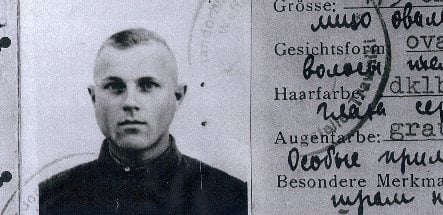John Demjanjuk, then known as Ivan, had himself registered in March 1948 as a displaced person – a category reserved mainly for former concentration camp prisoners and forced labourers, according to copies of records provided by the International Tracing Service (ITS) to AFP.
The ITS in the western German town of Bad Arolsen manages a vast archive documenting the fate of Nazi victims.
The agency on Tuesday provided a copy of what it said was Demjanjuk’s application dated March 3, 1948 in which he sought assistance as a refugee and asked for transfer to Argentina.
The file includes registration cards from 10 different refugee camps and medical records.
In a section in which he was asked to provide biographical information, he said he worked as a driver at the Sobibor concentration camp in today’s Poland but made no mention of his work as a guard.
German daily Bild, which first reported on the file Tuesday, quoted historian Hans-Juergen Boemelburg at the University of Giessen as saying that many war crimes suspects had attempted to escape justice after 1945 by presenting themselves as Nazi victims.
“There were about six million DPs (displaced persons). Among them were likely tens of thousands of collaborators who presented themselves as victims of deportation and were thus able to go underground,” he said.
Born in Ukraine in 1920, Demjanjuk was a soldier in the Red Army who was captured by the Nazis in the spring of 1942.
He trained at the Treblinka death camp in occupied Poland and served two years in the camps of Sobibor and Majdanek in occupied Poland and Flossenburg in Bavaria.
Demjanjuk has always insisted he was forced to work for the Nazis and had been mistaken by survivors for other cruel guards.
He immigrated to the United States in 1952 with his family, settling in Ohio where he found work in the auto industry.
Demjanjuk is wanted in Germany on charges of aiding the deaths of at least 29,000 Jews in concentration camps in Nazi-occupied Poland.
He has been fighting deportation to Germany, which issued a warrant for his arrest in March. The US government stripped him of his citizenship in 2002 after fresh evidence against him surfaced following the collapse of the Soviet Union.




 Please whitelist us to continue reading.
Please whitelist us to continue reading.
Member comments